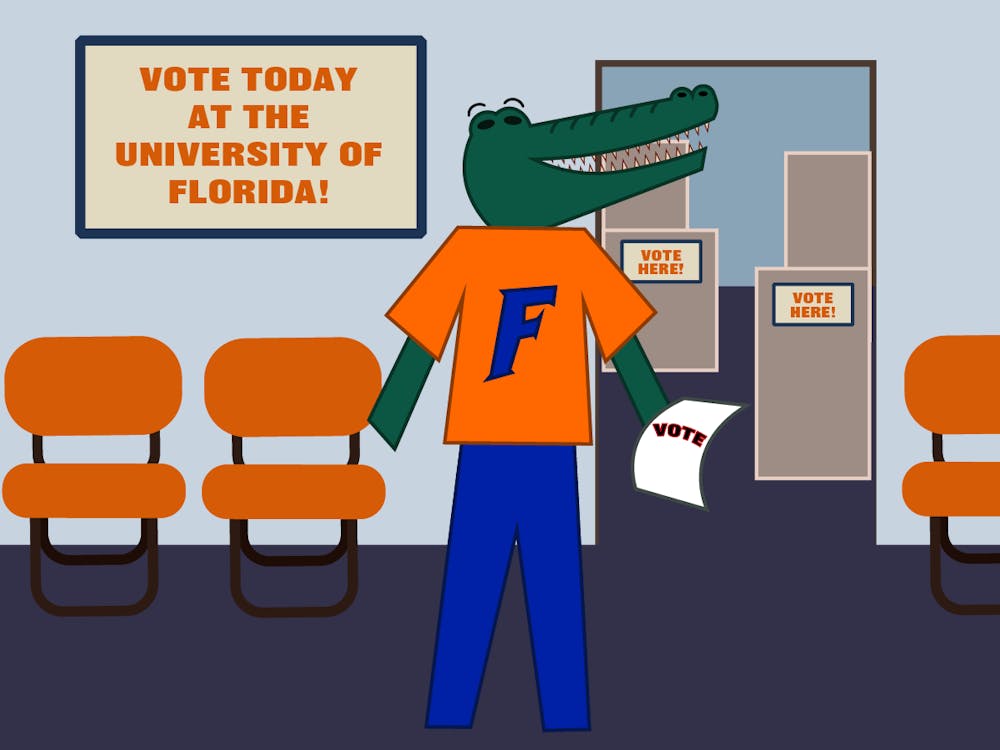Despite canvassing, tabling and campaigning efforts, UF Student Government elections have a low turnout rate. But among large public universities, UF isn’t alone.
Student turnout for elections is historically low
In the Fall 2024 SG election, about 10,000 UF students and graduate students cast ballots, based on data from UF SG’s Financial Reports and Results.
Compared to a total undergraduate and graduate student body size of about 62,000 for the same semester, that means about 16% of UF’s undergraduate and graduate students voted.
Though low, UF’s turnout ranks slightly ahead of in-state rival Florida State University, based on last Fall’s results.
The university also stacks up favorably across multiple large public four-year universities in the U.S. for the most recent Spring election, where low SG voter turnout is common — ranging from 4.5% at the University of Georgia to 15.5% at the University of Michigan, which was about on par with UF for its Spring elections in 2025.
The University of Michigan refers to its January through May semester as its Winter semester.
A majority of positions, like student body president, went uncontested in Georgia’s elections, which could help explain its low turnout. By comparison, at UF, just four out of 23 positions on the ballot were uncontested — and the presidential race wasn’t one of them.
Low voter turnout among youth doesn’t end with SG. In U.S. general elections, young adults have the lowest turnout rate for voting, and older age groups typically participate more than younger ones.
About half of eligible 18- to 29-year-olds voted in the 2024 presidential election, Tufts University’s Center for Information & Research on Civic Learning and Engagement reported.
Daniel Smith, a UF political science professor, studies the effect of political institutions on political behavior in the U.S. He’s also an affiliated faculty member of the UF Election Lab.
Smith said voting turnout in the U.S. tends to be lower the closer an election is to a person, meaning national elections garner more attention than local ones. Early in-person voting is one solution, he said.
He said if early in-person voting was allowed on weekends, people like students, who are in classes, and those who work throughout the week, could have more flexibility to vote.
“If you only have one day to cast your ballot, the barrier is much higher,” Smith said.
In Alachua County, early voting polling stations for the 2024 primary election were open Monday through Saturday. According to The Center for Election Innovation & Research, a majority of states across the country offered early voting on a weekend.
UF SG, however, does not offer early or virtual voting to students.
Students pay, even if they don’t vote
Regardless of whether they vote, UF students still pay tuition dollars every semester that go toward the SG budget. Student senators make decisions on how that budget is used, including planning keynote speakers and concerts.
Max Banach, a 22-year-old UF electrical engineering graduate student, encourages students to vote and look through records. He was twice a SG senator who ran under Change Party.
Despite busy schedules, jobs and full class loads, Banach encouraged people to do their own research before voting.
“Look at the names of the people writing the legislation, the legislation you truly want to see,” Banach said.
Banach said a campaign strategy to get people to vote is to talk about how much students pay toward SG’s budget.
“They don’t know that they’re paying into a system that is spending their money,” Banach said. “Their money might not be being spent the way that they would want it to be.”
Florida Statute 1009.24 requires the state’s students to pay fees out of their tuition toward Activity & Services Fees.
According to the State University System of Florida website, A&SF funds “support student government operations, student activities such as clubs and organizations, student centers and recreational sports for all campuses.”
For the 2019-20 fiscal year, the most recently available data, UF students paid $19.06 per credit hour toward SG’s budget — meaning a full-time student paid a minimum of $228 out of their tuition.
Students at UCF, meanwhile, pay about $11 per credit hour toward the A&SF SG budget, meaning a full-time student pays a minimum of about $140 toward it, according to public university data. It’s unclear whether this figure is up to date with the current academic year.
Faith Corbett, a 23-year-old UF alumna and administrative assistant in the Florida House of Representatives, said she tried to drive campus awareness of SG campaigns during her six semesters in Change Party.
That included advertising through social media, T-shirts and in-person slating, she said.
“You have to make it worth it to them,” she said of UF student voters. “You have to know what’s touching them. If you feel detached from your student government, it’s probably because you’re not involved.”
The party focused on maximizing support for its campaign through social media and internet memes.
“We made it a lot of fun to actually show out on an election day,” Corbett said. “You have people genuinely excited to go and vote for you.”
She said any showcase of SG and advocacy would be beneficial for students’ engagement with UF.
Corbett said the university should set up a Canvas page to raise visibility of SG elections, like an announcement about when elections will be held.
Contact Alanna Robbert at arobbert@alligator.org. Follow her on X @alannafitzr.

Alanna is a journalism senior and the Fall 2025 data reporter for The Alligator's Enterprise desk. She was previously a general assignment reporter for metro. Outside of reporting, she is found either with a book, in the gym or with friends playing pool.






